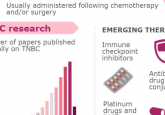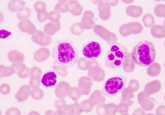Bowel cancer: could a three-drug combination prevent drug resistance?

A study from The Institute of Cancer Research (ICR; London, UK) has found that a three-drug combination therapy can prevent pharmacoresistance in bowel cancer patients. Having observed the success of multi-drug therapies in preventing resistance in tuberculosis and HIV, the researchers used the same approach and demonstrated its huge potential for preventing disease from developing resistance to drugs.
“At the ICR, we are interested in using the principles of evolutionary biology to understand how cancer can change over time and adapt to treatment – and what we can do to prevent this resistance from developing,” commented study author Paul Clarke (ICR).
“Our study shows the potential to use multiple targeted drugs together to overcome drug resistance in cancer, just as occurs in other diseases like HIV.”
The study, published in Oncogene, observed 47 bowel cancer cell lines to give a greater understanding of how resistance arises. The team demonstrated that the cells mutate and evolve when under the selective pressure of two molecularly targeted cancer drugs.
The drugs used, cobimetinib and pictilisib, target and inhibit the cell’s on and off signaling molecules, molecules shown to be mutated in bowel cancer and permanently stuck in either the on or off position. When first given, both drugs in combination successfully prevent cancer cell growth. However, after an exposure to a high dose of the drugs for a period of 8–10 weeks, the cells develop resistance due to a reduced sensitivity to one or both of them.
“This three-drug attack targets the cancer cells in multiple ways at once. The cells are unable to evade all drugs at the same time and therefore cannot survive.”
“Cancer patients often respond very well initially to modern targeted drugs, but there is always the concern that the cancer will evolve to resist treatment,” explained co-author Paul Workman (ICR).
“Our study dissected out the process by which bowel cancer cells evolve to become drug resistant, and has applied the knowledge gained to the design of a new triple combination treatment.”
Having noticed that the survival of bowel cancer cells was dependent on the cell death regulating BCL-2 family of molecules, the researchers added a third drug to the treatment. The addition of navitoclax, a BCL-2 inhibitor, resulted in a complete blockage of the development of resistance.
This three-drug attack targets the cancer cells in multiple ways at once. The cells are unable to evade all drugs at the same time and therefore cannot survive.
“We have shown that a three-pronged attack can be effective against bowel cancer cells by blocking off their various escape routes from treatment. The research is still at a fairly early stage, but in principle combinations of targeted drugs could be similarly effective against many other cancer types,” added Clarke.
“Further research is needed, but we think this triple combination of targeted drugs has the potential to help patients respond to treatment for much longer,” concluded Workman.
The drug combination now needs to be assessed in animal studies with the researchers warning that care would need to be taken to ensure the tolerability of drugs when used simultaneously.
Source: www.icr.ac.uk/news-archive/three-pronged-attack-can-overcome-drug-resistance-in-bowel-cancer
Related content
One in ten colorectal cancer patients are waiting over a year to start treatment
Younger colorectal cancer patients diagnosed at later stages, study finds




